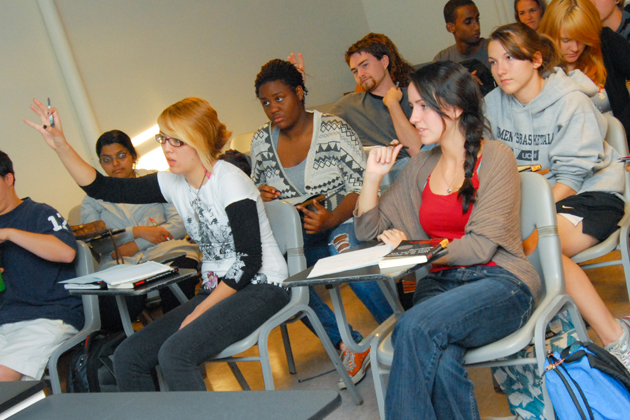
Students interested in the humanities have the opportunity this fall to live in a new living and learning community in Shippee Hall.
The Humanities House is affiliated with the Humanities Institute in the College of Liberal Arts and Sciences and will encourage students to learn about research in the humanities, even if they have not yet declared a major or plan to major in a non-humanities related field.
“Humanities are the heart of critical thinking, even if you expect to go into teaching, business, or law,” says Sharon Harris, professor of English and director of the Humanities Institute. Harris worked in business for more than 15 years before earning her Ph.D. and joining academe.
The house will allow the institute, which is located in the CLAS Building, to work more closely with undergraduates. “Our focus in the Humanities Institute has been on faculty and Ph.D. students completing their dissertations. We have not had a lot of contact with undergraduates in the past and that was a gap,” she says.

The program will connect students with the events offered once or twice a week in the institute, and will provide them with a freshman English course focused on the humanities. They will also be enrolled in a one-credit Freshman Year Experience course focused on the humanities.
The program can accommodate about 50 students, all of whom are freshmen this year. But they will be allowed to stay on in the Humanities House next year, so eventually students at all levels will be part of the program, Harris says.
She notes that all the students who are living in the house are interested in languages, English, and history, but that six so far are planning to major in social sciences or sciences. “We’re happy to have that integration,” she says.
Cathy Schlund-Vials, assistant professor of English and acting director of the Asian-American Studies Institute, will be the faculty director of the program. She is working on curriculum development, outreach, and assessment for the program.
“Most importantly, we will be explaining the program to incoming parents,” she says, adding that many don’t really understand the many career opportunities available to humanities majors.
Schlund-Vials says she is looking forward to the program, especially because it will afford her the opportunity to work with freshmen. “When students first come into the classroom, they do not initially envision themselves as scholars,” she says. “This program will take them from student to scholar.”
Some of the events students can look forward to might include dining with one of the 60 Humanities Institute fellows who will explain his or her work, participating as a group in events on campus, and developing ways to participate in the annual Humanities Institute conference in the spring.
“Research shows that for first-generation college students, learning communities improve retention rates and are linked to academic success. Many of the students in the house will be first-generation college students. As one of those myself, I take their mentoring very seriously,” says Schlund-Vials. “The house will be an important, intimate, friendly, familiar space for students who are attending a large university.”



